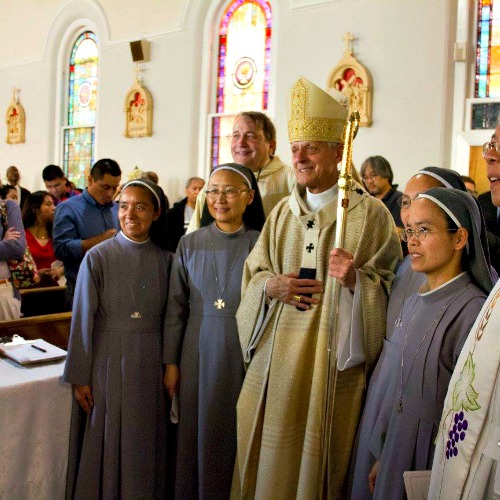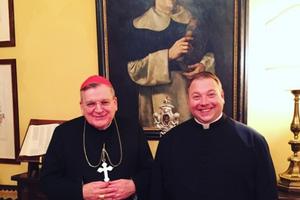Venerable ‘Father Al’: First Washingtonian on Path to Sainthood
DC archdiocese offers thanksgiving Mass for priest who created miracles by lifting more than 100,000 poor children out of poverty and into the richness of the faith.

WASHINGTON — The world hungers for heroes: men and women who give the last full measure of their lives in service to others. Now, the Church has recognized a hero who hailed from Washington: a native priest who saved more than 100,000 children from soul-destroying poverty.
For the Solemnity of the Most Holy Body and Blood of Christ (Corpus Christi), Cardinal Donald Wuerl came to Holy Name of Jesus parish in southeastern D.C. and celebrated a Mass of thanksgiving for Venerable Msgr. Aloysius Schwartz (1930-1992) — better known as “Father Al.”
He is a native son of the parish and the first Washingtonian to be recognized by the Church with the title “Venerable.” Earlier this year, Pope Francis issued a decree recognizing Father Al’s “heroic virtue” as a missionary and servant of the poorest of the poor in South Korea, the Philippines and Mexico.
In the sanctuary of the little red-brick church — the parish where Father Al received his first sacraments and discerned his vocation — his relatives, friends, sisters of the religious order he founded and graduates of the schools for poor children he served joined with the parish congregation in celebrating this major step forward on the path to canonization.
“Everyone needs examples; everyone needs role models,” Cardinal Wuerl told the Register. “Here, we are now, in the Church, saying: ‘This is a hero.’”
“Here is an example of someone just like you who says, ‘I’m going to follow Christ,’” the cardinal said. “And we need examples: They have to be close to home; they have to look like us; they have to be a part of the communities we grow up in; they have to speak like we do, so we can say, ‘He’s not that much different than I am. However, he did it well, and maybe I could do it that well.’”
“I think Father Al is an extraordinary model of taking the ordinary circumstances of life, and saying, ‘This is what Jesus is asking me to do, and I can do it perfectly well: I can do it with all of God’s grace, and I can be a force for good right where I am.’”

A Homegrown Saint
Father Al was born in Washington in 1930. He grew up in Holy Name parish and attended school there.
“We lived a very simple life, but it was the family together,” said Dolores Vita, his sister, recalling how they kept Sunday as a holy day by going to Mass and spending time together as a family. “It was a special day on Sunday: My mother would fix a very special meal — she was a good cook — and my father would take us all out for a ride while she was getting things ready.”
Vita believed that this simplicity in family life helped Father Al discern his call to serve in the priesthood among the poor. Whether it was getting ice cream on Sunday evenings or praying the family Rosary from time to time, Vita said, “The little things were appreciated.”
Father Al started his journey toward priesthood as a teenager entering the minor seminary in 1944. During his theological studies at the Catholic University of Louvain in Belgium, he became devoted to the Virgin of the Poor, who had appeared in Banneux, Belgium, and dedicated his priesthood to serving the poor.
He was ordained to the priesthood in 1957. The new priest went to Busan, South Korea, where he began working among the poor, caring particularly for orphans and children abandoned as a result of the Korean War.
Later, he founded a religious order called the Sisters of Mary — to be followed by a men’s order called the Brothers of Christ — and established Boys Towns and Girls Towns in South Korea that provide homes, education and job-skills training to impoverished children, which he then spread to the Philippines and Mexico. After Father Al’s death from Amyotrophic lateral sclerosis (ALS), or “Lou Gehrig’s disease,” in 1992, his order went on to open schools in Guatemala, Brazil and Honduras.
“He didn’t just want to help them — he wanted to give them the best that he could. They had enough suffering,” said his sister Dolores. “He said, ‘You want the best for your children; I want the best for my children.’ That’s the philosophy that he had.”
The cause for Father Al’s canonization began in Manila in 2003; and on Jan. 22, 2015, Pope Francis issued the decree recognizing his life of “heroic virtue” and declaring him “Venerable” — the step right before beatification, which generally requires a verified miracle.
“He had a lot of God-given talents and used every one of them constantly for the Lord,” Vita said. “He had tremendous faith, courage and imagination.”
Life-Changing Miracles
But in many ways, Father Al’s efforts have already worked miracles: More than 20,000 children attend schools run by the Sisters of Mary — who now number 380 sisters — and more than 107,000 children have graduated from the programs, going on to jobs or fields of higher education.
“To see his programs is to begin to understand the miracle,” said Glory Sullivan, a longtime friend of Father Al, noting the amazing transformation — physical and spiritual — that the children in Father Al’s schools underwent. Sullivan and her husband, Thomas, first met Father Al in 1974. Thomas Sullivan said that first meeting around the kitchen table transformed the lives of their family, and they became strong benefactors and promoters of his work.
“I just found him to be a saintly man,” Sullivan said.
Each poor child transformed by Father Al’s religious calling became a lifeline not only for that child, but also for his or her family.
When she was 10 years old, Sister Winnie Valencia was living in Tondo, the most densely populated section of Manila. Her family’s home was built in a massive landfill called “Smoky Mountain” — a hellish landscape, where children would scavenge for food on dump trucks, and fire and smoke would emerge from layers of trash internally combusting. Her mother found out about the Sisters of Mary, and she entered the school in 1985.
After going through the school, she graduated, became an accountant and worked for seven years to support her family and give them a better life. Then she joined the Sisters of Mary.
Her strongest memory of Father Al was running with him — she had a hard time keeping up with his much longer strides.
“Thinking about it, I feel that I am running with him now, in doing this work,” she said.
Regie Zamora, a high-school teacher at a Maryland charter school, said Father Al made a big difference in his life by providing him with the education that his parents never could have afforded.
“I went right on and attended university in the Philippines,” he said.
“I had seven siblings, and I was able to send five of them to college.”
‘Do God’s Will Right Where You Are’
Throughout his life, Father Al suffered illness; but he worked to the end of his life, even when ALS paralyzed him.
Sister Elena Belarmino, the order’s secretary general, recalled how Father Al invited her to join his congregation, even though health issues were the reason she had been rejected by the Daughters of St. Paul.
“All the saints are sickly: You see St. Teresa was sick,” he told her. “Do you want to be a sister? Why don’t you try it?”
She said his next words encouraged her to enter: “When you pray, you only have to ask for two things: You should ask for the light to see the will of God, and you have to ask for the courage to be able to do the will of God.”
Cardinal Wuerl said Holy Name parish was the right place to recognize Father Al because it was “where he learned that you can do God’s will right where you are.”
“This is his home, his spiritual home, and it just seemed the right place and proper place,” the cardinal said of the locale for the thanksgiving Mass.
“The message for today is: Wherever you are, Christ speaks to you; and he calls us all to be the best disciples we can be. Father Al is an example of simply responding to the call: hearing it, responding to it and giving your all to be the best you can be.”
Peter Jesserer Smith is the Register's Washington correspondent.
- Keywords:
- als
- canonization causes
- doing god's will
- faith
- goodness
- heroic virtue
- msgr. aloysius schwartz
- serving others
- serving the church
- serving the poor
- venerable
















